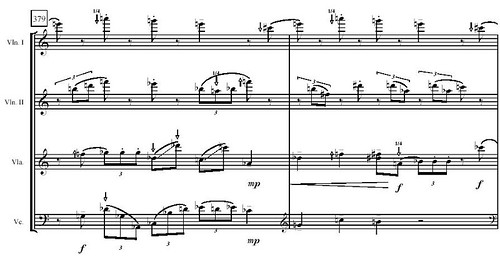
Kyle Gann has been blogging about over-notation. I'd read his online essay some time ago. He's right on the mark on this subject.
I'm a chronic over-notator. I learned early from a "professional" academic composer that there was no limit to the amount of information one should provide in a written score and it eventually folded into my personal style. I don't see over-notation as being inherently better or worse in terms of compositional craft. Not every piece calls for it. Indeed, my ears are often drawn strongest to things that aren't notated at all. I think some of these academics look at over-notation as some kind of evidence that the composer has taken multiple parameters into account and has worked out a fully formed idea. It's a valuable trait to consider every parameter as part of the final sound. Otherwise, one might think composing is about notes on paper as opposed to sound in all the rich ways one can perceive and slice it.
One of the largest pitfalls of over-notating - and Gann singles it out as well - is the tendency to artificially inject drama through extensive variation along every notated parameter. The most obvious example is dynamic markings. Not every idea is served by contrasting dynamics. Morton Feldman finds vast universes within the space between ppppp and ppp. It takes some measure of courage to find a notation that serves the idea and not the other way around.


1 comment:
this a very cool blog. really interesting and informed stuff. I look forward to learning more...
Post a Comment